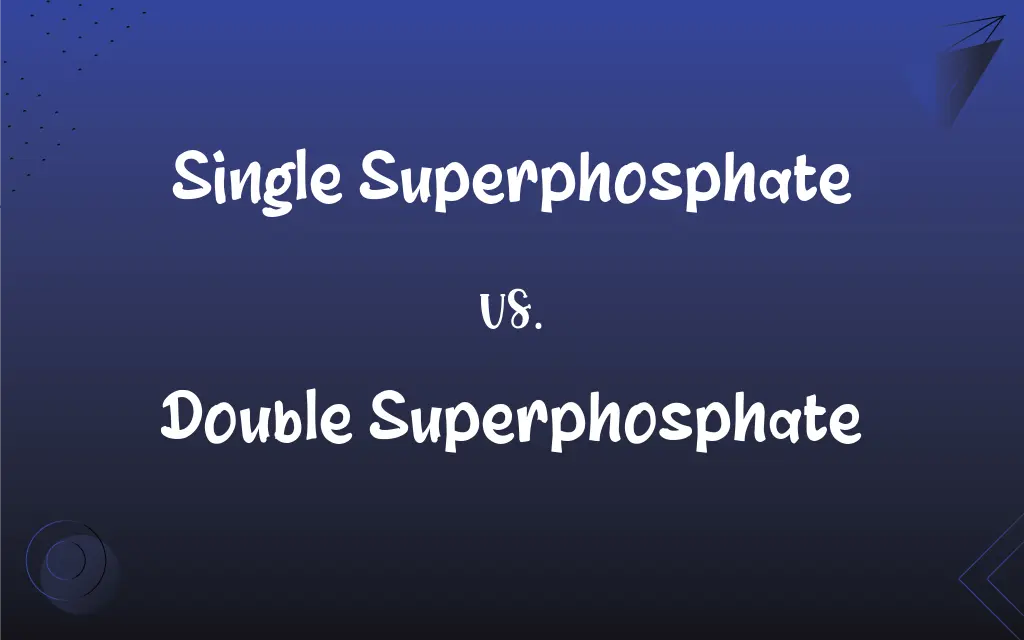Single Superphosphate vs. Double Superphosphate: What's the Difference?
Edited by Aimie Carlson || By Janet White || Published on March 1, 2024
Single superphosphate (SSP) is a lower concentration phosphate fertilizer, while double superphosphate (DSP) has a higher concentration of phosphate.

Key Differences
Single superphosphate is made by adding sulfuric acid to rock phosphate, resulting in a fertilizer containing 16-20% phosphorus. Double superphosphate, on the other hand, is produced by reacting rock phosphate with phosphoric acid, leading to a higher phosphorus content of about 35-40%.
The production of single superphosphate involves a simpler process with fewer steps, making it less expensive to manufacture compared to double superphosphate. The manufacturing of double superphosphate is more complex and requires more resources, reflecting in its higher cost.
Single superphosphate is widely used for a broad range of crops due to its lower phosphorus content and cost-effectiveness. Double superphosphate is typically used for crops requiring high phosphorus levels or in soils severely deficient in phosphorus.
Besides phosphorus, single superphosphate also contains sulfur and calcium, beneficial for certain soil types and crops. Double superphosphate primarily provides a concentrated source of phosphorus, with fewer additional nutrients compared to single superphosphate.
The use of single superphosphate is often considered more environmentally friendly due to its lower phosphorus concentration, reducing the risk of phosphorus runoff. Double superphosphate, with its higher phosphorus content, requires careful application to avoid environmental issues like eutrophication.
ADVERTISEMENT
Comparison Chart
Phosphorus Content
16-20% phosphorus
35-40% phosphorus
Manufacturing Process
Simpler, less resource-intensive
More complex, resource-intensive
Cost
Generally less expensive
More expensive
Additional Nutrients
Contains sulfur and calcium
Primarily phosphorus, fewer additional nutrients
Environmental Impact
Lower risk of phosphorus runoff
Higher potential for environmental issues
ADVERTISEMENT
Single Superphosphate and Double Superphosphate Definitions
Single Superphosphate
An environmentally friendlier phosphate fertilizer with lower phosphorus content.
Single superphosphate is preferred in sustainable farming practices to minimize phosphorus runoff.
Double Superphosphate
An intensive-use fertilizer produced by a complex manufacturing process.
Double superphosphate is often used in controlled agricultural settings for its efficiency.
Single Superphosphate
A lower concentration phosphate fertilizer suitable for a wide range of crops.
Single superphosphate is often applied to vegetable gardens to ensure balanced nutrient supply.
Double Superphosphate
A high-concentration phosphate fertilizer with 35-40% phosphorus, made from rock phosphate and phosphoric acid.
Double superphosphate is used in fields requiring high phosphorus levels for optimal crop growth.
Single Superphosphate
A fertilizer containing 16-20% phosphorus derived from rock phosphate and sulfuric acid.
Single superphosphate is commonly used to improve crop yields in phosphorus-deficient soils.
Double Superphosphate
A specialized phosphate fertilizer for crops with high phosphorus demand.
In commercial farming, double superphosphate is used to maximize yield in high-value crops.
Single Superphosphate
A granular phosphate fertilizer produced by reacting sulfuric acid with rock phosphate.
Single superphosphate is used in soil preparation before planting season for its nutrient release.
Double Superphosphate
A more expensive, concentrated phosphate fertilizer for phosphorus-deficient soils.
Double superphosphate is applied to orchards where intensive phosphorus is needed for fruit production.
Single Superphosphate
A cost-effective phosphate fertilizer with additional sulfur and calcium.
Single superphosphate is popular among farmers for its affordability and nutrient content.
Double Superphosphate
A potent phosphate source with minimal additional nutrients.
Double superphosphate is selected for its high phosphorus content in precision agriculture.
FAQs
How is double superphosphate different in composition?
Double superphosphate has a higher concentration of phosphorus with fewer additional nutrients.
Is double superphosphate suitable for all crop types?
It's best for crops with high phosphorus requirements or in severely phosphorus-deficient soils.
How does double superphosphate affect soil?
It significantly boosts phosphorus levels but requires careful management to avoid excess.
What is the main component of single superphosphate?
Single superphosphate primarily consists of phosphorus, sulfur, and calcium.
What crops benefit most from single superphosphate?
Single superphosphate is beneficial for a wide range of crops, especially those in phosphorus-deficient soils.
What environmental concerns are associated with double superphosphate?
Potential phosphorus runoff leading to eutrophication.
Can single superphosphate impact soil health?
Yes, positively by providing essential nutrients and improving fertility.
How cost-effective is single superphosphate?
It is more cost-effective due to its simpler production process.
Why is double superphosphate more expensive?
Due to its higher phosphorus content and more complex manufacturing.
Is double superphosphate suitable for small-scale farming?
It can be, especially in areas with significant phosphorus deficiency.
What is the shelf life of single superphosphate?
It has a good shelf life if stored properly in a dry place.
Is single superphosphate environmentally friendly?
Generally, yes, due to its lower phosphorus concentration.
How should double superphosphate be stored?
In a dry, covered area to prevent moisture absorption.
What precautions are necessary when using double superphosphate?
Proper application rates and timing are crucial to avoid over-fertilization.
How does single superphosphate release nutrients?
It releases nutrients gradually, suitable for sustained growth.
Is double superphosphate safe for all soil types?
Caution is needed, as excessive use can harm certain soil types.
Can single superphosphate be mixed with other fertilizers?
Yes, but it's essential to ensure compatibility.
How does weather impact single superphosphate application?
It's best applied in moist soil conditions for optimal effectiveness.
Can single superphosphate be used in organic farming?
It depends on the specific regulations governing organic farming in different regions.
Does double superphosphate release nutrients quickly?
Yes, it provides a rapid boost of phosphorus.
About Author
Written by
Janet WhiteJanet White has been an esteemed writer and blogger for Difference Wiki. Holding a Master's degree in Science and Medical Journalism from the prestigious Boston University, she has consistently demonstrated her expertise and passion for her field. When she's not immersed in her work, Janet relishes her time exercising, delving into a good book, and cherishing moments with friends and family.
Edited by
Aimie CarlsonAimie Carlson, holding a master's degree in English literature, is a fervent English language enthusiast. She lends her writing talents to Difference Wiki, a prominent website that specializes in comparisons, offering readers insightful analyses that both captivate and inform.







































































